In Italian, the pronoun “ci” is versatile, serving as a direct, indirect, and reflexive pronoun. It takes on various roles, acting as a pronoun of location and forming various pronominal verbs. Its multifunctionality can make “ci” confusing, but examining each function separately can clarify its meaning in different contexts.
“CI” and its multiple functions
The pronoun “ci” in Italian can be challenging for English speakers’ students due to its various functions. As mentioned, “Ci” can function as a pronoun, an adverb, or a part of certain verbs, and its meaning can change depending on the context. For example, “ci” can mean “there,” “us,” “to it,” or “about it,” among other things.
In this blog, we’ll take a look at all these functions one by one. We’ll start with the one you might already be familiar with and finish with the most advanced.
These are the various functions of “ci” that we’ll discuss:
- Direct pronoun
- Indirect pronoun
- Reflexive pronoun
- Verb esserci
- Adverb of place
- Demonstrative pronoun
- Pronominal verbs
- Common expressions with CI
.

.

1. Direct pronoun
In Italian, there are direct and indirect pronouns. They replace and avoid repetition of direct and indirect objects in sentences. Let’s simplify with some examples.
The following is an example of a direct pronoun, for this example, we’ll use the pronoun “la”:
Maria mangia la mela. Lei la mangia. (Maria eats the apple. She eats it.)
Here the direct object “la mela” is replaced by the direct pronoun “la”.
Let’s see now an example with the direct pronoun “ci”:
Lucia bacia Alfredo e poi me. Lei ci bacia sempre. (Lucia kisses Alfredo and then me. She always kisses us.)
Here the direct object “Alfredo and me” is replaced by the direct pronoun “ci”.
This is a list of the direct pronouns in Italian. As you can see “ci” is the direct pronoun which refers to us.
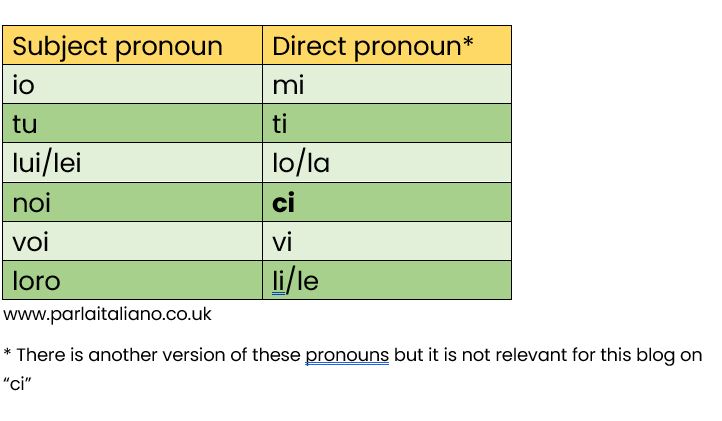
Direct pronouns serve as the direct object in a sentence; therefore, they are used when the verb is not accompanied by any preposition, and they answer questions such as “Chi?” (Who?) or “Cosa?” (What?)”.
In the previous example, the questions to determine the object are: Question: What does Maria eat? Answer: The apple (=direct object) Question: Who does Maria kiss? Answer: Alfredo and me (= direct object)
The lack of prepositions is the main difference between direct and indirect pronouns. So let’s see examples of “ci” as an indirect pronoun.

2. Indirect pronoun
Indirect pronouns have the function of indirect objects. Therefore, they are used when the verb is followed by a preposition for example “a” (to) and they answer the question “To whom? To what?“
Many verbs in Italian require a preposition for example:
Credere a (qualcuno) – to believe someone
Telefonare a (qualcuno) – to call someone
Scrivere a (qualcuno) – to write to somone
Chiedere a (qualcuno) – to ask someone
Here are a few examples:
Maria chiede a Filippo e a me di andare al cinema. Ci chiede di andare giovedì.
(Maria asks Filippo and me to go to the cinema. She asks us to go on Thursday)
“Ci” is the indirect pronoun that replaces the indirect object a Filippo e a me. Note that the indirect object is introduced by the preposition “a”.
Antonella telefona a Tom e a me. Ci telefona spesso. (Antonella phones Tom and me. She phones us onThursday)
When a verb requires a preposition it is followed by an indirect object.
Find here a list of the direct pronouns in Italian. As you can see “ci” is the indirect pronoun which refers to us.
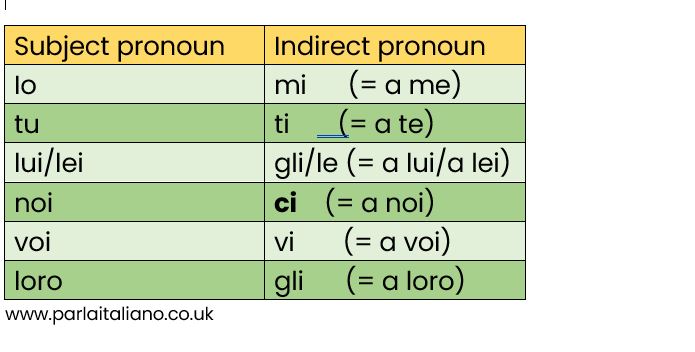

3. Reflexive pronoun
Reflexive pronouns (i pronomi riflessivi) “mi, ti, si, ci, vi”, and “si” look just like direct object pronouns, except for the third-person form “si” (which is the same in the singular and in the plural). In a reflexive sentence, the action of the verb refers back to the subject.
If you are unsure about what a reflexive pronoun is and how to conjugate reflexive pronouns, please download my extensive free, guide. This also includes explanations of other types of verbs called “reciproci” and “pronominali”. It comes with lists of verbs to learn by level as well. Download it HERE.
Here are some examples with the reflexive pronoun “ci”:
Noi ci alziamo sempre alle 7. (We always get up at 7am.)
Antonio ed io ci vestiamo sempre di blu. (Antonio and I always dress in blue.)
In the following table, you’ll find a list of the reflexive pronouns in Italian. As before, you can see “ci” is the reflexive pronoun which refers to us.
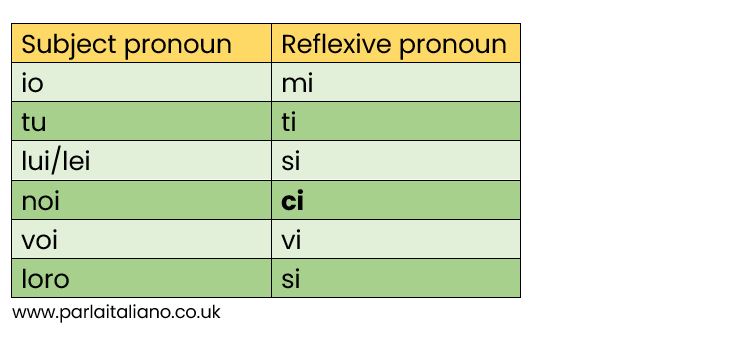

4. The verb “esserci”
The verb “esserci” is a pronominal verb, in other words, a verb that is used with a pronoun. The pronoun changes the meaning of the basic verb. In a way, this is similar to a phrasal verb in English, for example, to go is a basic verb and by adding a preposition the meaning of the verb changes for example to go off. In our case essere is the basic verb and by adding ci the meaning changes.
This verb has the meaning of existing in a real or figurative way or of being located in a specific space.
C’è/ci sono
The more familiar forms of the verbs “esserci” are c’è and ci sono :
c’é = there is
and
ci sono = there are
For example:
Ci sono 6 uova nel frigo. (There are 6 eggs in the fridge.)
Ci sono macchine in garage. (There are cars in the garage.)
Esserci
The verb esserci, when it is fully conjugated has a slightly different meaning. It means to be there, to be in a particular location.
Let’s take a look at the full conjugation of the verb:
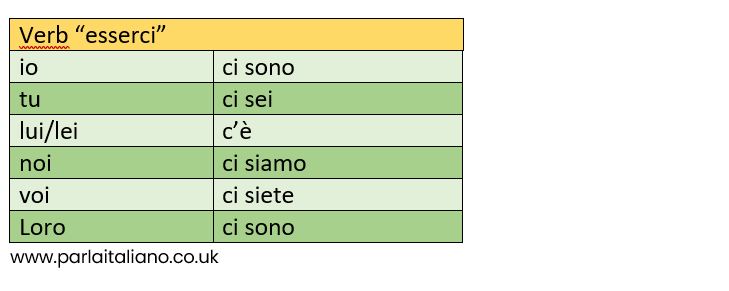
Here are some examples to better understand its meaning:
Ci siete alla festa domani? Sì, ci siamo. (Are you going to be at the party tomorrow? Yes, we’ll be there.)
Ci sei alla partita stasera? No, non ci sono. (Are you going to be at the match tonight? No, I am not.)

5. Adverb of place
“Ci” can take the function of an adverb of place, in this case it means here, there, in that place, etc. In Italian this is also known as “ci locativo”.
A few examples can clarify this use of “ci”:
Vai a Roma domani? Sì, ci vado con Claudia. (Are you going to Rome tomorrow? Yes, I’m going there with Claudia.)
In this case instead of repeating a Roma, I replace it with “ci”.
Sì, ci vado a Roma con Claudia.
Here are another couple of examples:
Conosco bene la città perché ci vado spesso. (I know the city well because I go there often.)
Vai al cinema con Antonio? Sì, ci vado stasera. (Are you going to the cinema with Antonio? Yes, I’m going there tonight.)
6. Demonstrative pronoun
“Ci” can function as a demonstrative pronoun; in this case it means ‘of it, in it, on it, to it.’ For example: puoi contarci (you can count on it.)
For example:
Pensi ancora al problema? No, non ci penso più.
(Do you still think about the problem? No, I don’t think about it anymore.)
Ci = al problema
Hai riflettuto sulla tua decisione? Sì, ci ho riflettuto e ho cambiato idea. (Have you thought about your decision? Yes, I thought about it and changed my mind.)
Ci = sulla tua decisione
7. Pronominal verbs
We have written a full blog on pronominal verbs. This blog includes the meaning and the conjugation of:
- Metterci
- Volerci
- Cascarci
- Rimetterci
You can find this blog post HERE.
To widen your vocabulary, in this blog we are going to look at three more, very common, pronominal verbs:
- Sentirci
- Vederci
- Tenerci
What is a pronominal verb?
These verbs are the category of verbs called ‘verbi pronominali’. They are made up of a basic verb which is used together with one or more pronouns. In our case the pronoun is “ci”. A pronominal verb has a different meaning than a basic verb. The conjugation of each pronominal verb follows a special pattern. In our three cases by adding the pronoun ci before the main verb.
1. Sentirci
Meaning:
To be able to hear well. So, sentirci refers to the physical ability to hear.
Conjugation:
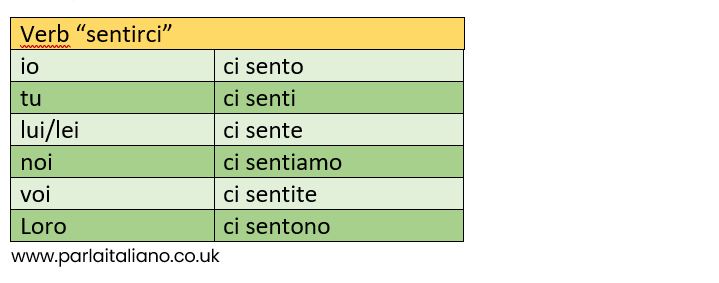
Here are a few examples for you:
Scusa puoi ripetere, non ci sento con tutto questo rumore. (Sorry can you repeat, I can’t hear with all this noise.)
Non gridare, ci sento molto bene! (Don’t shout, I hear very well!)
Lia non ci sente da un orecchio. (Lea can’t hear in one ear.)
2. Vederci
Meaning:
This is a very similar verb to the previous, it means to be able to see well. So, vederci refers to the physical ability to see.
Conjugation:
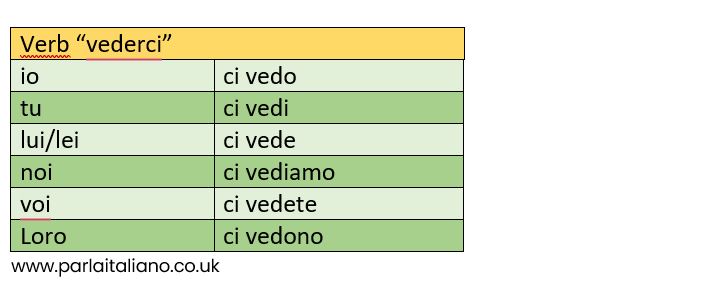
Some examples for you:
Mi porti gli occhiali, non ci vedo bene senza. (Can you bring me my glasses, I can’t see well without them.)
Sto guidando e con questo buio non ci vedo! (I’m driving and I can’t see in this darkness!)
Lia ci vede benissimo. (Lia can see very well.)
3. Tenerci
Meaning:
“Tenerci” means to care deeply about something, to hold something dear or really important.
Conjugation:
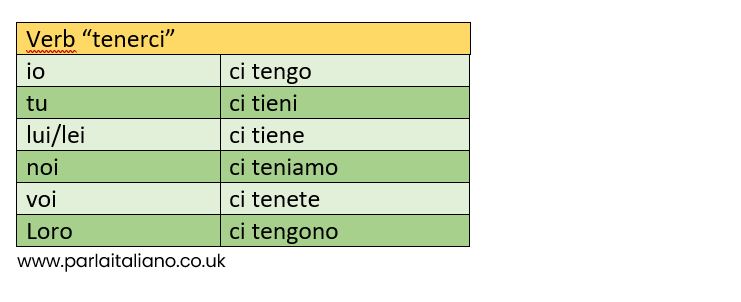
Let’s see some examples:
Domani viene mia suocera a cena, ci tengo a fare bella figura. (Tomorrow my mother-in-law is coming for dinner, I want to make a good impression.)
E’ un buon padre, ci tiene molto alla famiglia! (He’s a good father, he cares a lot about his family!)
Lia e Augusto si sposano, ci tengono che ci siano tutti i loro amici al matrimonio. (Lia and Augusto are getting married, they want all their friends to be at the wedding.)
.
8. Common expressions with CI
There are many common expressions with “ci” in Italian and I thought of closing this blog with some of them which can come in handy when you listen to real Italian.
Here are 3 of them:
- Ci sta
Ci sta means yes, it’s OK, it’s fine, it’s appropriate or enough. Note, this is used in quite informal contexts.
Example:
Domani ci vediamo? Sì, ci sta! (I’ll see you tomorrow? Yes, I am up for that!)
Beviamo un caffè? Sì, ci sta! (Shall we have a coffee? Yes, sure!)
Ieri eri veramente stanco e non hai studiato, ci sta. Ma oggi devi farlo. (Yesterday you were really tired and didn’t study, that’s okay. But today you have to do it.)
- Ci sto
This is a similar expression to the previous, it means I agree but also I’m in, deal.
Examples:
Facciamo una corsa, scommetto che arrivo prima io. OK, ci sto! (Let’s go for a run, I bet I’ll get there first. Ok, I’m in!)
Andiamo a Dublino, chi viene? Io ci sto! (We are going to Dublin, who’s coming? I am in!)
- Ci mancherebbe
This expression means not at all, don’t mention it. Italians use the expression “ci mancherebbe” but also a more emphatic “ci mancherebbe altro!”.
Example 1:
- La cena è pronta, scusami ma ho preparato solo un secondo.
- Ci mancherebbe! Sembra delizioso, grazie.
(- Dinner is ready, I’m sorry I have only prepared a main course.
– Not at all, it looks delicious, thank you.)
Example 2:
- Grazie papà per essermi venuto a prendere all’aeroporto così presto!
- Ci mancherebbe altro, sei sempre la mia bambina!
(- Thanks dad for picking me up at the airport so early!
– God forbid, you are still my little girl!)
.
Conclusions
To wrap it up, the Italian pronoun “ci” is more than just grammar; it’s woven into so much Italian and also many everyday expressions. From saying “Ci mancherebbe”, for a casual ‘no problem,’ to a laid-back “Ci sta” to show that you are up for something; these phrases bring a real touch to Italian chats. Learning these not only spices up your language skills but also lets you dive into the cultural vibe. So, as you dive into Italian, remember, mastering “ci” isn’t just about rules—it’s about adding some authentic Italian flair to your conversations. Cheers to making language learning a little more fun and real!







